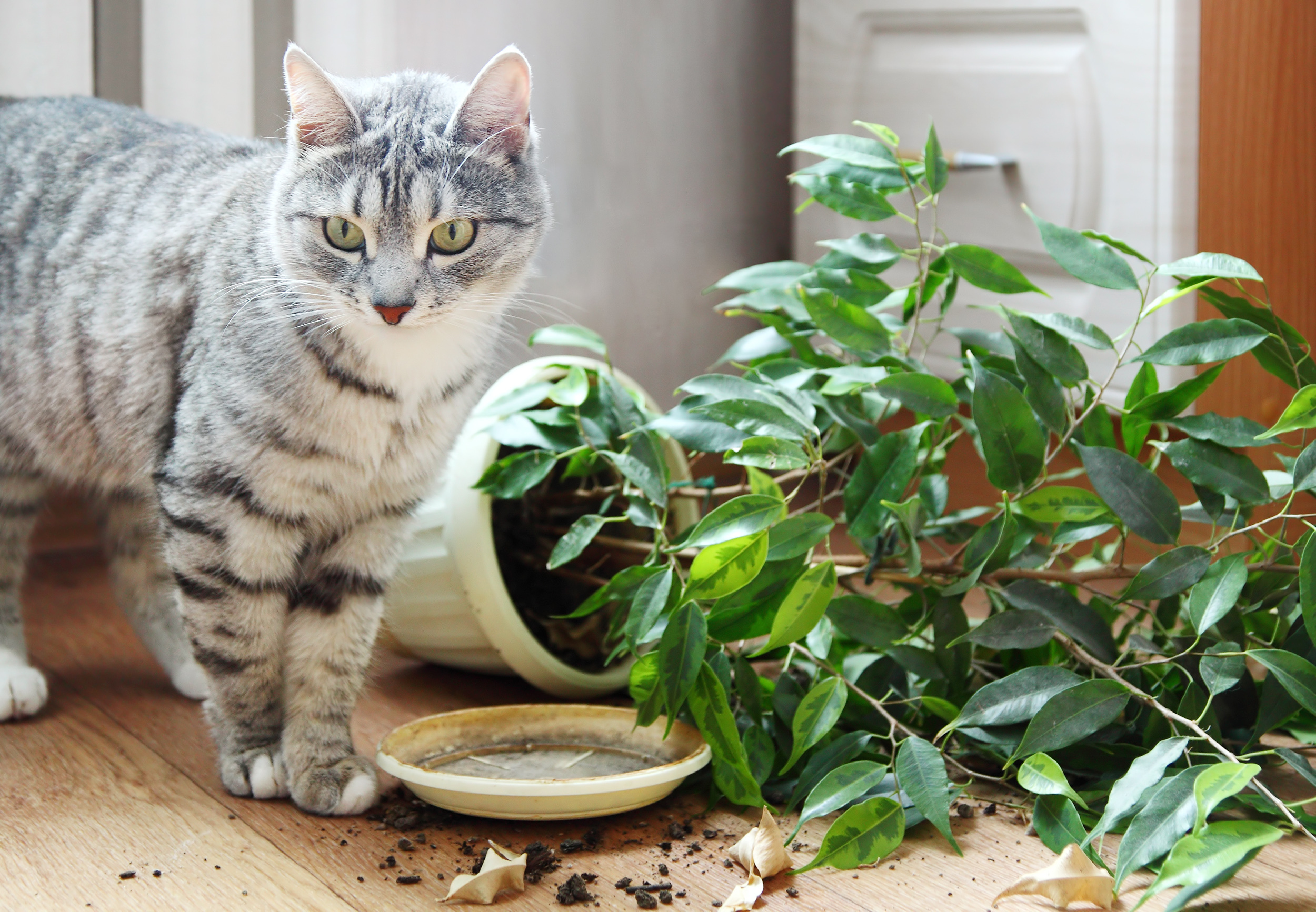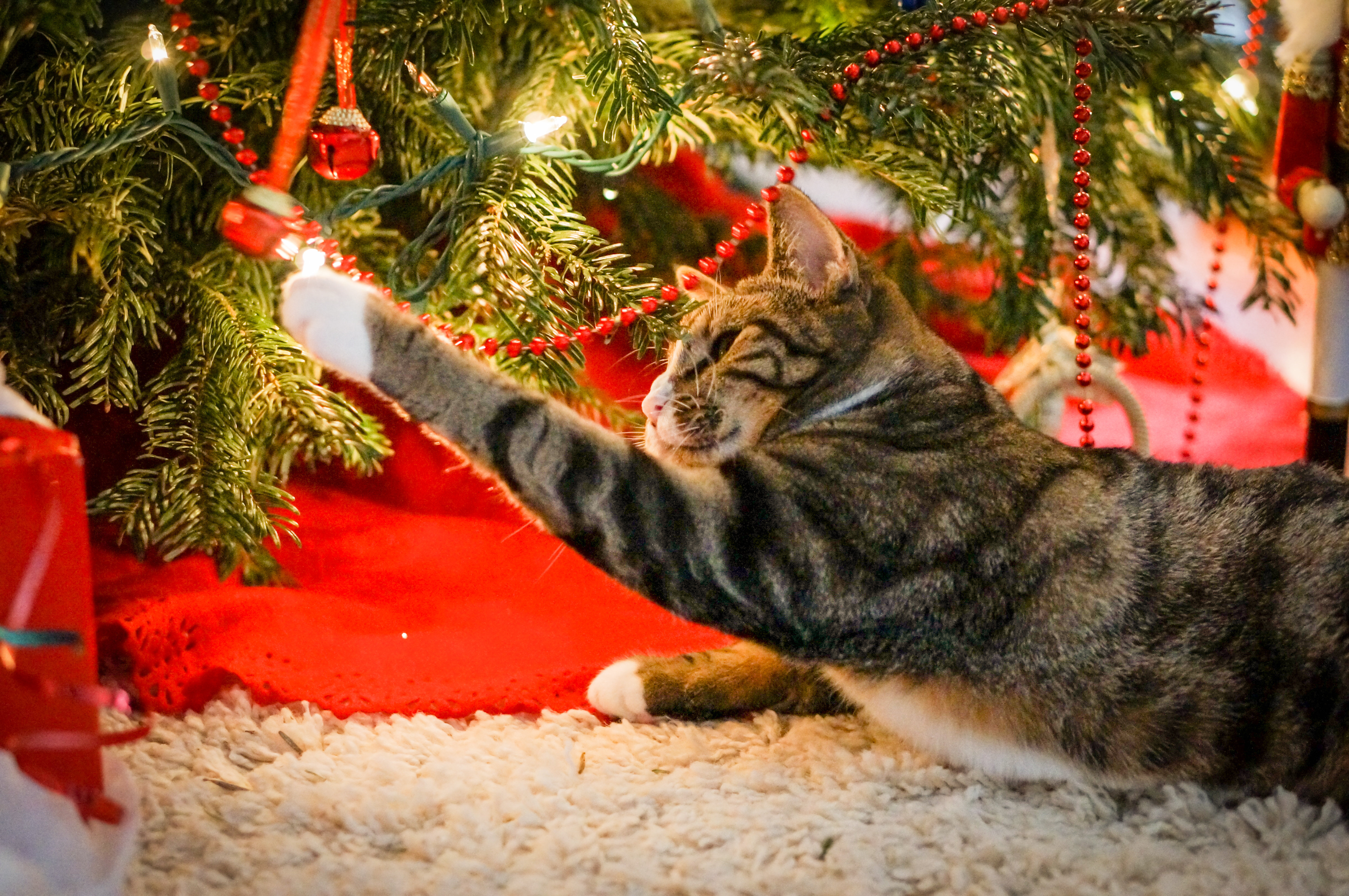Tips for Making Your Home Cat Safe
When inspecting a room to make it cat proof, you need to think like a cat. What surfaces look tempting enough to jump onto? How could you play “the floor is lava” in this room, jumping from furniture or fixtures? Where could you hide if you were around 10 lbs and made of liquid?
Check under beds, sofas, dressers and buffets and give a side-eye to area rugs, fireplaces, and bookshelves. What things could entice kitty’s curiosity or look like they’re begging to be explored with teeth or paws?
Here are a few areas to pay particular attention to, but this list isn’t necessarily exhaustive. If you think something might present a danger to your cat, err on the side of caution and take it off the table (sometimes literally!).
1. Small Craft, Office or Beauty Supplies Can Be a Danger
Your cat will likely find rubber bands, thumbtacks, paper clips, beads, needles, pins, yarn, and other small craft or office supplies interesting and may even assume they are toys. Don’t keep small items like these in open containers on your desk or crafting table unless you want to find them spilled on the floor where you can step on a tack or other sharp object. Kitty can also swallow them and damage their intestinal tract, so use closed containers or keep them away in drawers.
2. Secure Bookshelves and Tall Furniture to the Wall
Cats are climbers, and the top of your bookshelf or tallboy dresser is the best vantage point to survey their domain. Top-heavy furniture can topple over if a cat displaces the weight distribution so take the time to secure tall items to the wall using a bracket and zip-ties or a kit made for this purpose.
3. Loop or Tie Up Long Blind or Curtain Cords
Long cords hanging from blinds or curtains can become a choking hazard if they get wrapped around a cat’s neck. Install cord tie-downs, loop and tie them up off the floor or invest in cordless options to keep kitty safe.
4. Put Away Breakable Valuables on Cat-Accessible Surfaces
If your cat can jump on a surface, they will try. They love to explore and climb and are able to get to places you might not expect, like the top of the refrigerator or kitchen cabinets. Cats also love to knock things down (hey, it’s entertaining to them) so if you have vases, china, or statues made of glass or porcelain out and about, consider putting them in a cabinet and out of reach of curious noses and paws.
5. Check Your Windows and Doors
Cats love to explore and look out the windows. Check all windows and door latches to make sure they shut properly and that your cat cannot push them open. If you open your window to get some fresh air, make sure it has a well-secured screen that doesn’t have any rips or tears.
6. Keep Household Chemicals Closed and Inaccessible
Never leave a bin or bucket of cleaning solution around where your cat can get to it, especially ones containing bleach or ammonia. Even if kitty doesn’t try to take a sip, the strong fumes may be hard on your cat’s very sensitive upper respiratory system. Especially don’t use cleaners that contain pine oil or phenols around cats or to clean their litter boxes or food and water bowls.
Be especially careful with car antifreeze. It’s poisonous but smells enticingly sweet to cats. Don’t leave it around and clean up any drips or spills right away.
7. Protect Your Electrical Cords and Wires
Some cats are cord chewers, which can wreak havoc on your charging cables and cause kitty quite a shock. Invest in some cord protectors that cover your wires or tape down electrical cords with double-sided tape (cats do not like the stickiness) to discourage the behavior.
8. Make Sure None of Your Plants are Toxic to Cats

Everyone loves house plants, including kitties. Plants and cut flowers brighten your home and can help purify the air, but not all varieties are safe if you have cats. Cats often bite or chew leaves and foliage, so you should not have these plants around the house, or your yard if your cat is indoor-outdoor:
Poinsettias are not toxic to pets but can cause mild stomach upset if eaten, so use caution at the holidays.
9. Cover Your Compost and Trash Cans
If you have a compost container, make sure it has a cover. Some cats will get curious and try to taste the contents. Keep the compost in a cabinet or in a covered container so kitty won’t be tempted to ingest something they shouldn’t.
The same goes for trashcans in the kitchen, bathroom, and other areas of your house – use a receptacle with a lid. Don’t tempt kitty to turn open trashcans over, giving you something to clean up and a source of potential danger for your cat. Items like discarded dental floss can look like a fun toy but lead to an intestinal obstruction if kitty swallows them.
10. Keep Mothballs Away from Cats
Mothballs are toxic if eaten or sniffed, so keep them in drawers or clothing bags and bins (that your cat can’t get to) and not on the floor or on open shelves. Give kitty toys to bat around, not mothballs.
11. Keep Candles Out of Reach of Kitty Whiskers
Cats need to be away from open flames, whether in tapers, votives, jar candles or jack o’lanterns and fireplaces. Put candles out of kitty’s reach and never leave a candle or fire burning unsupervised. If you have a wood-burning fireplace, use a fireplace screen to protect kitty from the flames and possible embers.
12. Make Sure Your Medication is Inaccessible
Keep your meds in closed bottles and in cabinets out of reach to your cat. Rx bottles roll enticingly when batted with paws and the rattle of the pills can also be exciting. Swallow your meds right away if you open your pill organizer or put them out on the counter, and if you drop a pill be sure to find and dispose of it before kitty can consider a taste.
13. Cat Proof Your Balcony
If you live an an apartment or condo with a balcony, you probably love the view and the breezes. Kitty may enjoy the feeling of being outside on the balcony, but before you let your cat onto it, be sure it’s cat proof to avoid falls. You can install plexiglass, wire, screen, or netting that makes it so your cat cannot fit through the slats in the baluster or climb on top of the railing for a catwalk.
14. Keep Appliance Doors Closed
To avoid your cat going inside a freezer, washer, dryer, or dishwasher and getting shut inside, keep the doors closed on all appliances and always check inside before operating. Starting a washer or dryer with your cat inside – even for just short time – can be deadly. Get in the habit of doing a cat check before closing an appliance door or starting one up.
15. Watch Holiday Décor Around Cats

Yes, your cat may try to climb your Christmas tree and knock ornaments off onto the floor. Put fragile ornaments up high and toward the inside of the tree, closer to the trunk. Tinsel isn’t great around cats as they can try to chew it and swallow it, leading to a potential intestinal obstruction. Cats may also try to chew holiday light strands or even bite the tree branches. Both the leaves and the berries of yew, an ornamental evergreen tree with bright red berries, are toxic to cats so no matter how festive it looks, don’t use yew branches in your wreaths, arrangements, or décor.
Keep any fireworks for Independence Day away from your cat. And remember, cats are sensitive to loud noises so if you have an anxious kitty, exercise caution during firework season. When wrapping gifts, be sure to take care with ribbons and bows from packages as well.
16. Take Care with Essential Oils and Potpourri Burners
Many essential oils are toxic to cats. Don’t use diffusers with open tops that leave the oils accessible to curious cats who may take a whiff or sip. Keep your essential oil containers tightly closed and out of kitty’s reach.
17. Keep Plastic Bags Out of Reach & Cut the Handles Off Paper Bags
Cats can get trapped in plastic bags and injure themselves trying to get free. Cut the handles off any paper bags before putting them on the floor for kitty to explore and don’t use plastic bags as a toy.
Kitten Proof Your Home Before Adopting
As smaller versions of cats, kittens need some special attention for safety in your home. All of the cat proofing suggestions above still hold true, but also watch the following:
18. Keep the Toilet Bowl Covered
Kittens are small enough to fall in and drown. Keep your toilet lid closed at least until your kitten gets bigger, or better yet, make the bathroom off limits for now (unless you have to put the litter box in there). In fact, you may want to continue the habit of keeping the toilet lid closed after your kitten is grown, since toilet bowl cleaners are harmful and you wouldn’t want the lid to drop down on your cat by accident.
19. Remove or Tie Up Curtains and Drapes
Floor-length curtains and sheers (especially waterfall drapes) will be irresistible for a kitten to climb. Until they’re trained to use a scratching post, consider removing them or tying them up out of reach.
20. Snip or Skip Six-pack Holders
The plastic rings around cans or bottles are a choking hazard for small kittens. Don’t bring them in the house or cut the loops before disposing in the trash. And see above for keeping your trash covered and out of reach.
Make Sure Your Litter Box is Set Up in a Safe Area
Your cat’s litter box should be a refuge, a quiet place where they can go and safely do their business. When setting up a litter box properly, make sure it’s in an area that your cat can access any time day or night and that there aren’t any objects that could fall on them while using it. Don’t keep your household chemicals near your cat’s litter box, and remember not to clean it with anything containing ammonia, bleach, or pine oil.
Use a Cat Litter You Trust
Choose a cat litter that fits your (and kitty’s) preferences for texture, odor control, weight, and tracking. Try:
- ARM & HAMMER™ Slide™ Easy Clean-Up Clumping Litter for no scrubbing and scraping when cleaning the litter box, patented Clump & Seal™ technology to lock in wetness and odor and 100% dust-free granules that are soft on kitty’s paws.
- ARM & HAMMER™ Clump & Seal™ Complete Odor-Sealing Clumping Cat Litter will keep your home from smelling like you have a cat, or several cats – for 7 days, guaranteed. So effective, millions have switched.
- ARM & HAMMER™ Double Duty Clumping Cat Litter controls both urine and feces odors, is low-tracking and 99% dust-free with a fresh clean scent and the power of baking soda.


